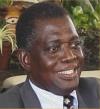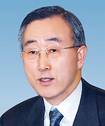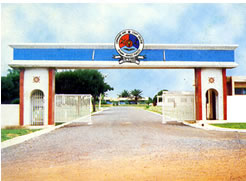
The Vice President, Alhaji Aliu Mahama, has appealed to the private sector to play a more visible role in promoting the arts in the country. "I want to use this opportunity to appeal to the private sector, the engine of our economic growth, also to become the engine of our cultural development", he said while launching a book entitled 'Journey', written by Dr Gheysika A. Agambila, Senior Lecturer at Ghana Institute of Management and Public Administration (GIMPA), in Accra on Tuesday.
Alhaji Mahama urged the private sector to sponsor out-door sculpture at public spaces, as well as competitions in dance, theatre and creative writing in district and regional capitals. "We shall give due recognition to such good corporate citizens.”
He said what distinguishes Ghana from other nations was not the country’s production of material things. "It is our culture. Our struggle for nationhood is not only about harnessing our resources for our material well-being".
Alhaji Mahama pointed out that the struggle for nationhood was not a one-time event, but a continual struggle to preserve, develop and promote culture as Ghanaians and as Africans. “It is not only our lands that were colonized, but our minds were also colonized. We had largely freed our land from the colonizers, but what of our minds?” he asked.
He stated that if the nation should be truly free, then Ghanaians should first be proud to be Ghanaians and Africans. He said the struggle for the preservation, development and promotion of the nation’s culture was a sacred one, waged by forebears. "We must continue this eternal and sacred struggle so that generations to come will not be lost".
The Vice President said those who have read the book and are scholars of English Literature at the University of Ghana, Legon were convinced that the book and its author will surely help redefine the national literary landscape.
"I see this literary work to be a contribution to our cultural development," he reiterated.
He said much of what mankind knows was captured in books, and asked: "How shall we know, if we don't read?” The Vice President also urged adults to read often, if they wish to keep relentless senility at bay. "If we the adult don't read, what message are we sending to the youth".
The first copy of the novel was auctioned at 5.5 million cedis. It has a retail price of 50,000 cedis and would be made available at the University bookshop, the EPP bookshop and other supermarkets.
Sub-Saharan Publishers, EPP Books and Dr Agambila published the book.
Dr Agambila, a former deputy Minister of State at Harbours and Railways, spent four years to produce the book. It is about a grandfather who sees the world around him changing in post-independence Ghana.
This grandfather’s ambition was to get sugar, literally meaning money in the story, so he sent his eldest son to work in Southern Ghana, considered to be a land of opportunity, especially to Obuasi where gold is mined.
The son got married and had two kids and did not go home often. “Migration changes things”, but grandfather’s plans were further thwarted when his son was killed in a mine accident. So he sent out the second son, who also ended up in Accra, via a fufu pounding stint in Kumasi to seek greener pastures.
“The Journey, that is this life, has unexpected happenings, including endings”.
Dr Agambila has worked with Ernst and Young (Ghana) and taught at the University of Ghana, Business School. He also served as a Deputy Minister of State at the Ministries of Finance and Economic Planning, and Environment and Science.
He is also the author of "Solma, tales from Northern Ghana", a collection of short stories for children.
Dr Paa Kwesi Nduom, Minister for Public Sector Reform, chaired the launch.
He said the novel was written in sober, yet often moving style, and rich in the way it reflects the realities of the Ghanaian post-colony.
"It is based, as the title suggest, on a 'simple' journey storyline and presents credible characters whose actions and experiences hold the readers' interest unwavering".
The Minister noted that as Ghana’s educational system developed, the country needed its own books introduced into the system.
He noted that the symbolism of the book captured the perception of development and also depicted issues of migration.
In attendance were Ms. Christine Churcher, Member of Parliament (MP) for Cape Coast, Deputy Ministers, Bankers, Lecturers, family members and friends of the author.
GNA










